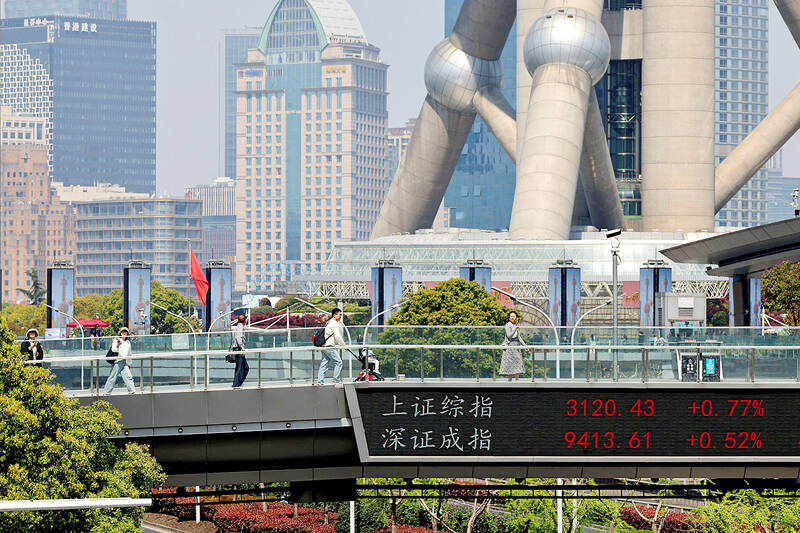Exposure to China among Taiwanese financial institutions — including banks, insurance companies, securities and futures brokerages, and investment trusts — reached a record-low NT$876.95 billion (US$29.71 billion) at the end of April, Financial Supervisory Commission data showed on Sunday.
Their exposure was down NT$165.75 billion, or 15.89 percent, from a year earlier amid concerns over a slowing Chinese economy, rising local government debts and a multiyear real-estate crisis, as well as persisting geopolitical risks, the commission said.
In terms of declines in total exposure, the banking sector experienced the largest drop, as Taiwanese banks cut their combined exposure — including lending, investments, and interbank loans and deposits — by NT$145.27 billion, or 15.16 percent, to NT$813.2 billion from a year earlier, the data showed.

Photo: Reuters
Taiwanese banks scaled back lending to the Chinese market by a combined NT$99.87 billion from a year earlier and decreased investments by NT$20.83 billion and interbank loans by NT$24.57 billion over the same period, it showed.
The sector’s exposure to China has declined for seven consecutive years since the US-China trade dispute started in 2018.
As of the end of April, local banks’ exposure accounted for 17.2 percent of the sector’s net worth, the lowest level since the data became available in the third quarter of 2013, the commission said.
Taiwanese insurance companies’ investments in marketable securities in China fell NT$20.9 billion, or 29 percent, from a year earlier to NT$52.4 billion at the end of April, accounting for only 0.16 percent of the sector’s total disposable funds, it said.
The sector’s investments in Chinese securities were all made by life insurers, while property and casualty insurers have held no securities in China since January 2023, it said.
Meanwhile, the combined exposure to China of Taiwanese securities and futures brokerages, as well as securities investment trust and consulting firms rose NT$457 million, or 4.2 percent annually, to NT$11.35 billion at the end of April, accounting for 1.39 percent of the sector’s net worth, the data showed.
The sector’s expanded exposure to China reflected that securities firms’ proprietary finance units slightly increased investments in short-term debt holdings, the commission said.

South Korea’s equity benchmark yesterday crossed a new milestone just a month after surpassing the once-unthinkable 5,000 mark as surging global memory demand powers the country’s biggest chipmakers. The KOSPI advanced as much as 2.6 percent to a record 6,123, with Samsung Electronics Co and SK Hynix Inc each gaining more than 2 percent. With the benchmark now up 45 percent this year, South Korea’s stock market capitalization has also moved past France’s, following last month’s overtaking of Germany’s. Long overlooked by foreign funds, despite being undervalued, South Korean stocks have now emerged as clear winners in the global market. The so-called “artificial intelligence

NEW IDENTITY: Known for its software, India has expanded into hardware, with its semiconductor industry growing from US$38bn in 2023 to US$45bn to US$50bn India on Saturday inaugurated its first semiconductor assembly and test facility, a milestone in the government’s push to reduce dependence on foreign chipmakers and stake a claim in a sector dominated by China. Indian Prime Minister Narendra Modi opened US firm Micron Technology Inc’s semiconductor assembly, test and packaging unit in his home state of Gujarat, hailing the “dawn of a new era” for India’s technology ambitions. “When young Indians look back in the future, they will see this decade as the turning point in our tech future,” Modi told the event, which was broadcast on his YouTube channel. The plant would convert

‘SEISMIC SHIFT’: The researcher forecast there would be about 1.1 billion mobile shipments this year, down from 1.26 billion the prior year and erasing years of gains The global smartphone market is expected to contract 12.9 percent this year due to the unprecedented memorychip shortage, marking “a crisis like no other,” researcher International Data Corp (IDC) said. The new forecast, a dramatic revision down from earlier estimates, gives the latest accounting of the ongoing memory crunch that is affecting every corner of the electronics industry. The demand for advanced memory to power artificial intelligence (AI) tasks has drained global supply until well into next year and jeopardizes the business model of many smartphone makers. IDC forecast about 1.1 billion mobile shipments this year, down from 1.26 billion the prior

People stand in a Pokemon store in Tokyo on Thursday. One of the world highest-grossing franchises is celebrated its 30th anniversary yesterday.